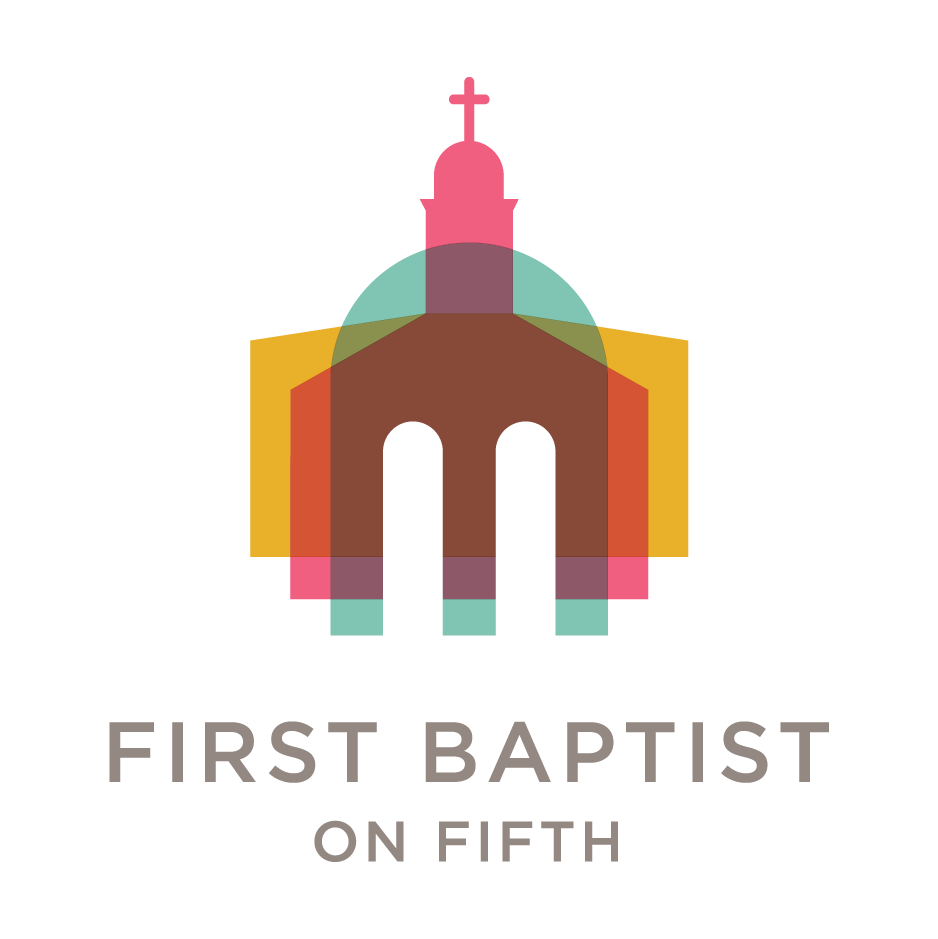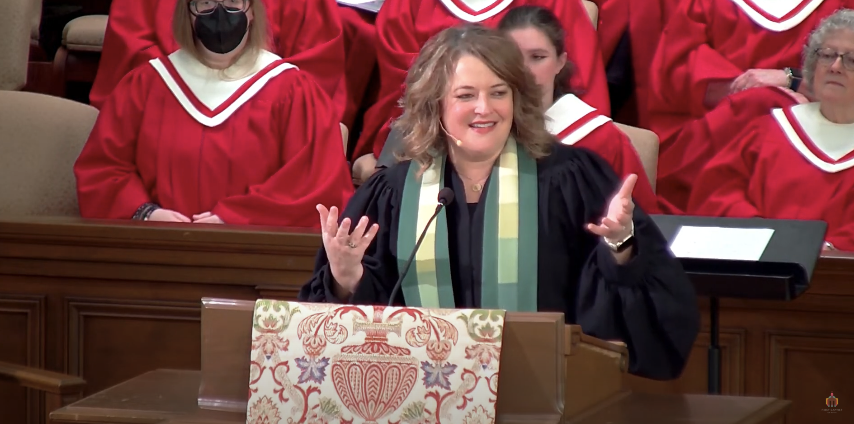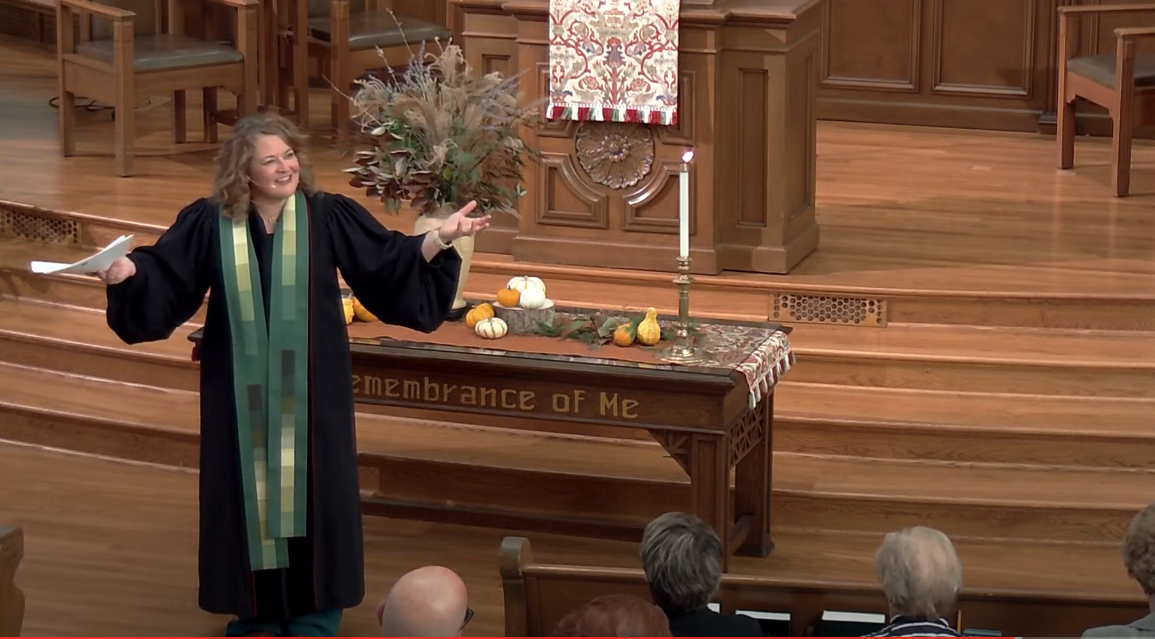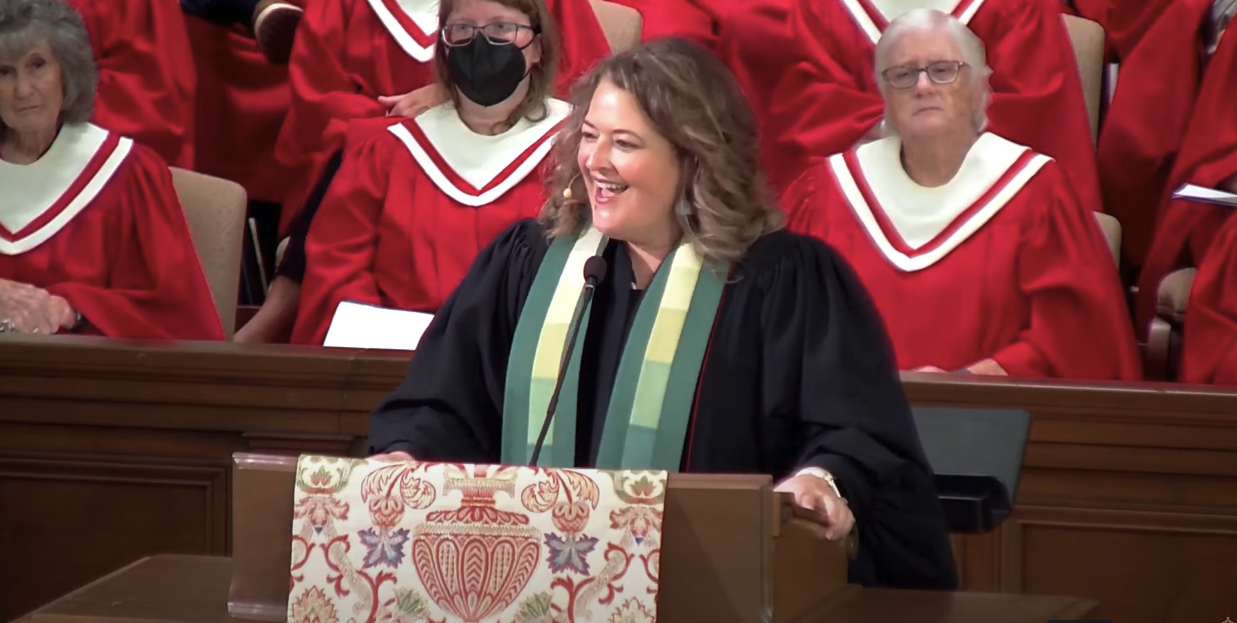I.Experiences in the water often become core memories for us, don’t they? Maybe for you it’s the memory of deep sea fishing with your grandpa, or cannon-balling off the dock into the lake, or taking long walks on the beach in an annual family vacation, or wading out into the stream and examining the rocks and tadpoles you find within.
I can hardly think of water and core memories like these without thinking of an experience my family had several years ago. With Annabelle’s permission, I’ll share that story. That summer, the five of us traveled for a vacation to stay with my aunt and uncle, just off the coast of Charleston, South Carolina, in their home right on the marsh. We spent one afternoon out on the dock, crabbing and fishing, and let me just tell you that neither Josh nor I are fishers, so we were learning along with our kids. One moment as Annabelle leaned back to cast her fishing line, she cast not the line but the whole rod right there into the water.
We tried to cheer her up, telling her it would be ok. I even sang a few rounds of “Under the Sea,” but somehow that didn’t work. As luck would have it, Josh happened to wake up in the night around 3:15am, and decided, “what the heck, the tide has gone out, I might as well go look for that fishing rod!” When Annabelle woke up the next morning, there it was – the fishing rod, rescued from under the sea. But somehow she never again used it.
II.This core memory for us might evoke memories for you, for our time in and through the water matters deeply in the shape of our living. We continue with our exploration of creation through the Psalms, today looking carefully at Psalm 65 and what it might teach us in particular about God’s love of the world particularly revealed in the waters that flow through it. Like the other Psalms we’ve read these past few weeks, Psalm 65 uses images of creation to illustrate the psalmist’s praise to God. But this psalm has long been characterized not as a praise or creation psalm, but rather a psalm of thanksgiving, one perhaps used in a harvest celebration as a word of gratitude to God. For you only have to read line by line to hear of the psalmist’s thanksgiving. For God answers prayer, God forgives, God blesses, God saves, God delivers, God cares and creates and nothing is outside of God’s reach. For God, the psalmist says, is “the hope of all the ends of the earth and of the farthest seas.”
How does the psalmist characterize that abundance? By speaking in present tense for what God does, and using images of highest mountains and roaring seas, going to the farthest ends of the earth and the gateways of the day and night, and ultimately, describing the water that flows into every corner and crevice of this earth like the goodness of God itself, showering this world God so loves with abundance. I was reminded this week that the psalmist is writing in the midst of an arid climate! Desert surrounds the people of Israel, and any rain they experience is seen as nothing short of a defining gift of God.1 For no bountiful harvest comes without the rain, no abundance without the water that softens even the hardest ground. “Praise is due to you, O God!” Praise is due indeed.
III.Even though we’re not the authors of this beautiful psalm, we too find imagery of creation helpful in anchoring our talk to God or about God. I’ve been thinking in particular this week about how the metaphors of water are useful, even necessary to color the state of one’s spiritual life.
When we feel parched – where our lips struggle to name the praise due to God, perhaps grieving following a loss, or disillusioned with the state of things, or blistering mad at another – we might feel withered or parched. Burned up and burned out. Dehydrated of purpose, and thirsting for a better way. We’re in a spiritual drought, we might say, empty of all that brings life. We echo the sentiment of Psalm 102, which says, “my days are like a declining shadow; and I – like grass, I’m dried up.”
Or perhaps when we feel like we’re drowning – where we can’t possibly look up and around to notice God’s good gifts because of… well, life, perhaps overwhelmed with responsibilities, or drowning in work, or engulfed by fear – we might feel bloated or swollen. Underwater and overstuffed. Sloshing around through the muck of our lives, and sodden with despair. We’re flooded, we might say, awash at sea with God seemingly nowhere to be found, but unlike old Noah, there’s no dove or olive branch or land in sight.
Yet there are times – I trust we’ve all experienced them – when it feels that the waters of our lives are just right, and God’s presence runs right through it. We move fluidly throughout our homes and tasks and relationships. Our values match our commitments, and we’ve found our way into the flow. When the waters of challenge hit the rocks, they find another way around. “The impeded stream,” as Wendell Berry once said, “is the one that sings.” We recognize, if but for a season, that abundance and flourishing are available, and present, and gift upon gift. Like the prophet Amos who said, “let justice roll down like waters, and righteousness like an ever-flowing stream,” God’s good gifts are rolling, flowing, moving gracefully, nimbly through the current of our days.
Truth be told, we’ll all experience each of these stages of life, just like the psalmist did. One day, we’re singing praise to God, and the next, crying out “how long oh Lord?!” Yet I want to invite us today into considering how the cycle of living – from our parched days, to our submerged days, to our flourishing days, and all their twists and turns – reveals a God who never leaves us, who cycles through this world in continuous love and who flows like a river from beginning to end, from Genesis’ garden to Revelation’s, from rain through springs and creeks and ponds and swamps to oceans and seas, from the waters of the womb through baptisms to the final rest. On learning about the water cycle in school, author Katherine May remembered it was, “a matter of evaporation, rain, rivers, and seas. But only recently did I begin to understand what that preserved,” she says. “The water endures, sublimating between states, becoming brackish, being cleansed, infiltrating into the soil. Between water and our bodies there is effortless communication, both engaged in an endless saturated exchange.”2 With God, as with water and our bodies, might we be engaged in an endless saturated exchange! With this life held by God, might we “enter the midst of something [like water] that joins me to everything, everywhere, in all time”!3
IV.In each of these weeks talking through the singing nature around us, not only do we hear how the psalms weave praise and thanksgiving to God, but we’re also exploring an ethical response to these various elements. How do they call us to respond?, we ask. The skies invite our humility and wonder. The land calls forth our respect and hope. And the waters?I’d like us to consider today that the words of Psalm 65 and the waters summon us to the values of shalom and generosity.4
First, shalom. I love Neal Plantinga’s definition ofshalom the most. He says this: “the webbing together of God, humans, and all creation in justice, fulfillment, and delight is what the Hebrew prophets call shalom. We call it peace, but it means far more than mere peace of mind or a cease-fire between enemies. In the Bible, shalom means universal flourishing, wholeness, and delight – a rich state of affairs in which natural needs are satisfied and natural gifts are fruitfully employed, a state of affairs that inspires joyful wonder as its Creator and Savior opens doors and welcomes the creatures in whom they delight. Shalom, in other words, is the way things ought to be.”5
We consider shalom when we “come to the peace of wild things, into the presence of still water,” as Wendell Berry says. We live shalom when we seek peace: not just a tranquility maintained by distraction or nonchalance, but a shalom of body and spirit, of relationships and community, of humanity and our creator. Dr. King gave us some language for shalom, calling out those well-intentioned white folks “who prefer a negative peace which is the absence of tension to a positive peace which is the presence of justice.”6 Shalom can only be found when we seek it over and above the gaps and breaches and sins that distance us from the flow of God who wants to bring life. Shalom asks us to consider the things we have done and left undone, to work toward the day when all of Creation is reconciled to one another and to God. When “the world is the way things ought to be.”
Next, generosity. Generosity allows us to give and receive, to enter the flow of sharing. Of generosity with our financial resources, Robin Wall Kimmerer reminds us that “hoarding the gift, we become constipated with wealth, bloated with possessions, to heavy to join the dance.”7 Yet the waters of this earth remind us of God’s generosity, and our invitation to return back to God what God has given to us.
We consider generosity when we recognize God’s generosity to us, that all this life is gift. Generosity and gratitude go hand in hand. We receive it and share it, and receive it and share it, like that water cycle that flows from rain to stream to bath to ground and back again, baptizing us in goodness and grace and orienting us to that which is bigger than we can ever know. Like Antoine de Saint-Exupery once said, “If you want to build a ship, don’t drum up people to collect wood and don’t assign them tasks and work, but rather teach them to long for the endless immensity of the sea.”8 Generosity teaches us to long for the immensity of the sea, giving us a window into the vast horizon God sets before us.
V.So how do we practice shalom and generosity? How do we awaken to their gifts in our lives?
Last week, my neighbor Shelley saw a video of me telling you to love the land by putting your bare feet on the grass and your hands in the dirt, and texted me a picture of her in her backyard doing just that! “I’m taking your cue and channeling my inner hippie!,” she said.
So today, I encourage you to go stand in the rain and let all your senses awaken. Don’t be a bystander to it, passive and protected, but rather be part of the downpour. Let yourself get soaked.9 Stand in the rain a bit, but immerse yourselves in other waters. Get all the way in the ocean when you go to the beach. Don’t pass up an opportunity to stick your feet in the cold springs in the summer. Scoop up a handful of the river, and splash it on your face. Remember the goodness of God who provides water to our parched places.
Do these things to be awakened by the waters, then use them to practice shalom and generosity. We’re to be what Nicholas Wolterstorff calls “aching visionaries:” visionaries, because we can imagine God’s good future filled with the kingdom of shalom, yet aching, yearning with twinges of sadness for the absence of shalom in our living.10
VI.In her book, How to Do Nothing, Jenny Odell calls her readers to resist the lure of escapism in the face of this world’s challenges, where withdrawal, permanent retreat, even creating a utopia free from all the mess beckons us beyond the “debris of the present.” Rather, she encourages a mode of
“standing apart,” “look[ing] at the world (now) from the point of view of the world as it could be (the future) with all the hope and sorrowful contemplation that this entails.”11
She tells a story of the San Clemente Dam in Monterey, California, built in 1921 by a real estate company aiming to get water to the growing community of citizens on the Monterey peninsula.12In just 20 years, a large amount of sediment filled it up such that another larger dam was built upstream. And by the 1990s, the San Clemente Dam was deemed not only useless, but now seismically unsafe due to its location near a fault line that, in the event of an earthquake, would have sent a torrent of water and 2.5 million cubic yards of accumulated sediment into towns downstream. Humans weren’t the only ones in danger, because now the steelhead trout couldn’t pass through the dam’s fish ladder, nor were there the small pools or hidden areas created by debris for the trout to enjoy due to the dam. What fishermen once saw as a flush spot for trout who numbered in the thousands had dwindled to a mere 249 trout in 2013.
As local leaders debated what to do, the cheapest option was a $49 million dollar plan to dump more concrete toward the dam to stabilize it in the event of an earthquake. But the option chosen by the California agencies working on this project wasn’t the easiest or cheapest, opting for an $84 million dollar plan to remove the dam and restore the habitat for the waters’ inhabitants, like the trout and the California red-legged frog.
Did I mention this wasn’t the easiest project? So much silt had accumulated that before anything happened, these workers had to reroute
the river around the old dam site for sediment storage, which effectively meant creating a riverbed from scratch. Once the river was rerouted, six excavators and two 16,000 pound pneumatic hammers came to slowly, scrupulously dismantle the concrete structure and turn it to dust, bit by bit. Drone footage and time-lapse photography made for quite the story. Because in a twist on what one might expect seeing dozens of workers and heavy machinery, instead of slowly erecting a structure, one was scrupulously taken down. Concrete disappearing instead of appearing. One wise artist overlaid these photos with those of the dam being built with similar precision and care nearly 100 years prior. But now, a voice narrates the dam’s destruction, saying, “Building dams was once a triumph of humankind’s ability to control nature. As our society evolves, we are learning to seek balance rather than control in our relationship with our environment.”13
You know, when that dam was first built, it was called innovative and ingenious. But over time, the shalom diminished for humans, for creatures, for the land. The flow of generosity had stopped. And in just as innovative a way, the removal of the dam gave space for thanksgiving and hope to once again flow freely from life to life and back again.
Friends, Psalm 65 and the encouragement of the waters invites us to a practice of shalom and generosity, where we’re entering into the movement of God in this world. May it be so for you today, and in all the days to come! Amen!









